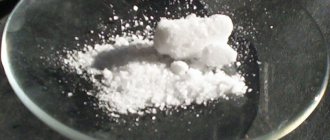Pharmacological action of Thyrotom
The active component of Thyrotoma has anabolic (when taken in small doses) and catabolic (when taken in large doses) effects. Replenishes the deficiency of thyroid hormones, causing an increase in tissue demand for oxygen, an increase in the level of basal metabolism, and also helps to enhance energy processes and inhibit the production of thyroid-stimulating hormone.
In addition, according to the instructions, Thyrotom helps improve many body functions, including having a positive effect on the functioning of the liver, kidneys, as well as the cardiovascular and nervous systems.
Indications for use of Thyrotom
According to the instructions, Thyreotom is prescribed for the treatment of hypothyroidism and euthyroid goiter.
Thyrotom is also used after surgical treatment of thyroid cancer - as a drug for replacement therapy and prevention of goiter relapse (after resection of the thyroid gland). In addition, the drug is used as one of the components of the combined treatment of diffuse toxic goiter (after achieving a euthyroid state with thyroid hormones - thyreostatics).
Release form and composition
Dosage form - tablets: white, round, flat-cylindrical, the edge is beveled, a dividing line is applied on one side (60 pcs. in glass bottles, 1 bottle in a cardboard pack; 50 pcs. in blisters, 1 or 2 in a cardboard pack blister).
1 tablet contains:
- active ingredients: levothyroxine – 0.04 mg, liothyronine – 0.01 mg;
- auxiliary ingredients: gelatin, corn starch, lactose monohydrate, magnesium stearate, colloidal silicon dioxide, glycerin (glycerol) 85%.
Contraindications to the use of Thyreotom
According to the instructions, Thyreotom is not recommended for use: for acute myocarditis, untreated adrenal insufficiency and untreated thyrotoxicosis, for angina pectoris of functional class III-IV, acute myocardial infarction, individual intolerance to the components of the drug.
Thyrotom is prescribed with caution in case of long-term severe hypothyroidism, diabetes mellitus, as well as in the presence of a number of diseases of the cardiovascular system, such as heart failure, tachycardia, arterial hypertension, tachyarrhythmia, coronary heart disease. Including: angina pectoris I-II functional class, history of myocardial infarction and atherosclerosis. Elderly people are also prescribed the drug, taking into account all possible consequences.
special instructions
Before treating hypothyroidism caused by damage to the pituitary gland, laboratory tests should be performed to detect adrenal insufficiency. If this diagnosis is confirmed, glucocorticosteroid replacement therapy is started before the use of thyroid hormones for the treatment of hypothyroidism in order to avoid the development of acute adrenal insufficiency.
Thyrotom does not affect the speed of psychomotor reactions and concentration of attention necessary to perform types of work related to driving vehicles and complex mechanisms.
How to use Thyreotom
The duration of treatment with Thyrotom, as well as the daily dose, are prescribed by the attending physician strictly individually and depend on the indications.
For adults with hypothyroidism, it is recommended to take one tablet at the beginning of treatment. Every half a month or a month, the daily dose is increased by one tablet until it reaches an effective dosage (from 2 to 5 tablets). For children, the daily dose is prescribed taking into account age and body weight; as a rule, it is no more than two tablets. Typically, treatment is long-term, and in some cases you need to take the drug for life.
The initial dosage for adults in the treatment of euthyroid goiter is two tablets of the drug, the maintenance dose of Thyrotoma is no more than six tablets. For children, the dose is usually half as much. The duration of treatment is at least several months.
During the prevention of goiter recurrence, carried out after surgery, take from 2 to 3 Thyrotom tablets, for thyroid cancer (also after surgery) - from 3 to 6.
During pregnancy and lactation, the use of Thyrotom, which was prescribed for hypothyroidism, is usually not discontinued, and sometimes when pregnancy occurs, the dose of the drug (daily) is even increased.
Thyreotom
Release form, composition and packaging
The tablets are round, flat-cylindrical, white, with a beveled edge, with a one-sided scoring line.
1 tab.
- levothyroxine 40 mcg
- liothyronine 10 mcg
Excipients: lactose monohydrate, corn starch, gelatin, colloidal silicon dioxide, magnesium stearate, glycerol 85%.
Clinical and pharmacological group: Thyroid hormone preparation
pharmachologic effect
A preparation of synthetic thyroid hormones. Replenishes the deficiency of thyroid hormones. Increases tissue oxygen demand, stimulates their growth and differentiation, increases the level of basal metabolism (proteins, fats and carbohydrates). In small doses it has an anabolic effect, and in large doses it has a catabolic effect. Inhibits the production of thyroid-stimulating hormone. Enhances energy processes, has a positive effect on the functions of the nervous and cardiovascular systems, liver and kidneys.
Pharmacokinetics
Levothyroxine. When taken orally, levothyroxine is absorbed almost exclusively in the upper small intestine. Up to 80% of the dose taken is absorbed. Eating reduces the absorption of levothyroxine. Cmax in serum is achieved approximately 5-6 hours after oral administration. After absorption, more than 99% of the drug binds to serum proteins (thyroxine-binding globulin, thyroxine-binding prealbumin and albumin). In various tissues, approximately 80% of levothyroxine is monodeiodinated to form triiodothyroin and inactive products. Thyroid hormones are metabolized mainly in the liver, kidneys, brain and muscles. A small amount of the drug undergoes deamination and decarboxylation, as well as conjugation with sulfuric and glucuronic acids (in the liver). Metabolites are excreted in urine and bile. T1/2 of levothyroxine is 6-7 days.
With thyrotoxicosis, T1/2 is shortened to 3-4 days, and with hypothyroidism it is extended to 9-10 days. Liothyronine. Absorption when taken orally is 95% (within 4 hours). The connection with plasma proteins is high. T1/2 - 2.5 days.
Indications
- hypothyroidism;
- euthyroid goiter;
- as a replacement therapy and for the prevention of goiter recurrence after resection of the thyroid gland;
- thyroid cancer (after surgical treatment);
- diffuse toxic goiter: after achieving a euthyroid state with thyreostatics (in the form of combination therapy).
Dosage regimen
The daily dose is determined individually depending on the indication.
Hypothyroidism.
Adults: treatment begins with 1 tablet of Thyreotom per day, then the dose can be increased by 1 tablet every 2-4 weeks until a maintenance daily dose of 2-5 tablets is achieved
Children: when selecting a dose for long-term treatment, take into account the body weight, height and body surface of the child. The average recommended maintenance dose is 2-2.5 Thyrotom tablets per day.
Euthyroid goiter.
Adults: the initial dose is 1-2 tablets per day, the maintenance dose is 3-6 tablets per day.
Adolescents: the initial dose is ll.5 tablets per day, the maintenance dose is 2.5-3.5 tablets per day.
Children: prescribed 1/2-1 tablet. per day.
Prevention of goiter recurrence after surgical treatment.
Adults are prescribed 2-3 tablets per day.
After surgical treatment for thyroid cancer, the initial dose is 3 tablets per day, the maintenance dose is 6 tablets per day.
The daily dose of the drug is taken once in the morning, at least 30 minutes before breakfast, without chewing and with a sufficient amount of liquid.
The drug should be taken regularly.
The duration of treatment is determined by the form of the disease. As a rule, for hypothyroidism and after thyroidectomy for thyroid cancer, treatment is carried out throughout life. The duration of use for euthyroid goiter, as well as for the purpose of preventing goiter relapse after surgical treatment, ranges from several months or years to lifelong use.
Side effect
When used correctly under medical supervision, there are usually no side effects.
Allergic reactions, progression of heart failure and angina may occur.
Contraindications
- increased individual sensitivity to the drug;
- untreated thyrotoxicosis;
- acute myocardial infarction, angina pectoris III-IV functional class;
- acute myocarditis;
- untreated adrenal insufficiency.
The drug should be prescribed with caution for diseases of the cardiovascular system: ischemic heart disease (atherosclerosis, angina pectoris I-II functional class, history of myocardial infarction), heart failure, arterial hypertension, tachycardia, tachyarrhythmia; diabetes mellitus; severe long-term hypothyroidism; malabsorption syndrome (dose adjustment may be required); old age.
Pregnancy and lactation
During pregnancy and breastfeeding, therapy with thyroid hormones prescribed for hypothyroidism should continue. During pregnancy, an increase in the dose of the drug is required due to an increase in the level of thyroxine-binding globulin.
The use of the drug in combination with thyreostatics during pregnancy is contraindicated, as an increase in doses of thyreostatics may be required. Since thyrestatics, unlike levothyroxine, can cross the placenta, the fetus may develop hypothyroidism.
The amount of thyroid hormones secreted in breast milk during lactation (even when treated with high doses of the drug) is not enough to cause any problems in the child. However, during breastfeeding, the drug should be taken with caution, strictly in recommended doses under the supervision of a doctor.
special instructions
In case of hypothyroidism caused by damage to the pituitary gland, it is necessary to find out whether there is simultaneous insufficiency of the adrenal cortex. In this case, replacement therapy with glucocorticosteroids should be started before treatment of hypothyroidism with thyroid hormones is started in order to avoid the development of acute adrenal insufficiency.
Effect on the ability to drive vehicles and operate machinery: the drug does not affect professional activities related to driving vehicles and operating machinery.
Overdose
In case of an overdose of the drug, symptoms characteristic of thyrotoxicosis are observed: palpitations, cardiac arrhythmias, heart pain, anxiety, tremor, sleep disturbance, increased sweating, increased appetite, weight loss, diarrhea.
Depending on the severity of symptoms, the doctor may recommend reducing the daily dose of the drug, a break in treatment for several days, or prescribing beta-blockers. After side effects disappear, treatment should be started with caution at a lower dose.
Drug interactions
Thyrotom enhances the effect of indirect anticoagulants, which may require a reduction in their dose.
The use of tricyclic antidepressants with Thyrotom may lead to an increase in the effect of the antidepressants.
Thyroid hormones may increase the need for insulin and oral hypoglycemic agents. More frequent monitoring of blood glucose levels is recommended during periods of initiation of treatment with the drug, as well as when changing its dosage regimen. Thyrotom reduces the effect of cardiac glycosides.
With simultaneous use of cholestyramine, colestipol and aluminum hydroxide, they reduce the plasma concentration of the drug by inhibiting its absorption in the intestine.
When used simultaneously with anabolic steroids, asparaginase, tamoxifen, pharmacokinetic interaction is possible at the level of protein binding.
When used simultaneously with phenytoin, salicylates, clofibrate, furosemide in high doses (250 mg), the content of thyroid hormones not bound to blood plasma proteins increases.
Taking estrogen-containing drugs increases the content of thyroxine-binding globulin, which may increase the need for Thyrotome in some patients.
Somatotropin, when used simultaneously with Thyreotom, can accelerate the closure of epiphyseal growth zones.
Taking phenobarbital, carbamazepine and rifampicin may increase the clearance of levothyroxine and require an increase in the dose of Thyreotom.
Storage conditions and periods
At temperatures from +15° to +25°C, out of the reach of children!
Shelf life: 3 years.
Do not use after the expiration date stated on the package.
Overdose
An overdose of Thyrotom is usually characterized by symptoms similar to thyrotoxicosis. These include: heart rhythm disturbances, palpitations, heart pain, increased appetite, diarrhea, tremors, increased sweating, anxiety, weight loss, sleep disturbance.
Depending on how pronounced these symptoms are, the doctor decides to interrupt treatment for several days, reduce the daily dose of Thyreotom, and possibly prescribe beta-blockers. As soon as the patient's condition improves, treatment is continued, but using a lower dosage.
Drug interactions
The combined use of certain medications with Thyrotom may cause undesirable effects, so caution must be exercised. Such consequences are possible due to drug interactions: with indirect anticoagulants (since Thyrotom helps to enhance their effects, which often leads to a revision of the prescribed dosage), with tricyclic antidepressants (the drug enhances their effect and increases the risk of developing undesirable consequences), with asparaginase, tamoxifen and anabolic steroids (possible pharmacokinetic interaction at the level of protein binding), with cardiac glycosides (their effect decreases).


